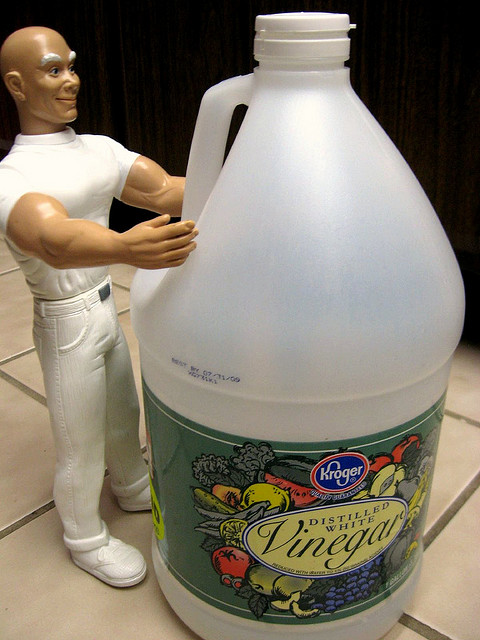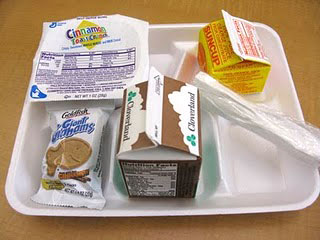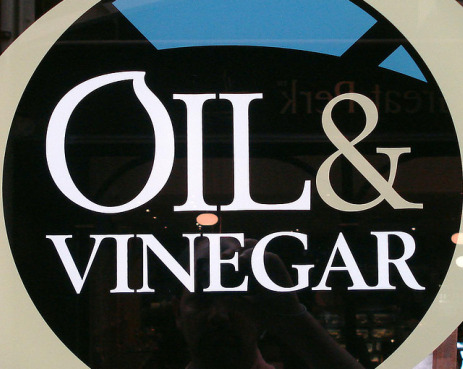Send your question to Umbra!
Q. Dear Umbra,
I have been using and promoting white vinegar as a natural alternative for cleaning products for a long time. Until recently I never asked how it was made or where it came from.
When I finally did ask, I heard that some white vinegar may be produced from fermenting ethanol from natural gas or petroleum derivatives. If this is true, how can we be sure our vinegar is “natural”?
Whitney
 Mr. Clean! Mr. Clean! Are there fossil fuels in that vinegar?Photo courtesy elycefeliz via FlickrA. Dearest Whitney,
Mr. Clean! Mr. Clean! Are there fossil fuels in that vinegar?Photo courtesy elycefeliz via FlickrA. Dearest Whitney,
Pondering the provenance of vinegar can fall by the wayside if you’re busy pondering the origins and meaning of life. We’ll get to that, but first I want to say thank you for your vinegar vigor! White vinegar, in its elegant simplicity, is one of the multi-purpose wonders of the world. It can be used to clean, disinfect, deodorize, remove stains, shine, and polish. You can use it in the laundry, as hair conditioner, and it makes a fine vinaigrette.
Which brings me to a dressing you might not want to use or eat — oil in vinegar. And by oil, I do not mean olive. The oil in some vinegars is actually a petroleum byproduct, synthetic ethyl alcohol, aka ethanol.
Here’s a quick primer on how white vinegar is made. A stork flies in from the South carrying a bundle. Oh, wait. That’s something else. Vinegar is the result of a process called fermentation, where a concert of yeast and bacteria turn sugar into acetic acid. The yeast starts by converting sugars into alcohol, or more specifically ethyl alcohol. The bacteria then ferment the ethanol into acetic acid, the key ingredient in vinegar.
Ethanol is crucial to the process and it can come from natural sources such as fermented juice, cider, wine, or beer. But ethanol can also be made synthetically from natural gas and petroleum. “U.S. refineries produce between 19 and 20 gallons of motor gasoline from one barrel (42 gallons) of crude oil. The remainder of the barrel yields distillate and residual fuel oils, jet fuel, and many other products,” says the U.S. Energy Information Administration.
Quite the vinegar pickle, if you consider the impacts our use of petroleum products has on air, surface, and ground water, local ecosystems, and dare I say, climate change. Not to mention the concerns people like you rightly have about the safety of putting a petroleum-based product into food.
While the FDA doesn’t think using synthetic ethanol in vinegar or any other food substance is a good idea, the regulations currently in place under the Federal Food, Drug, and Cosmetic Act, and the Alcohol Administration Act do not restrict its use. At least the FDA does have this policy against misleading labeling:
Synthetic ethyl alcohol may be used as a food ingredient or in the manufacturing of vinegar or other chemicals for food use, within limitations … Any labeling reference to synthetic alcohol as “grain alcohol” or “neutral grain spirits” is considered false and misleading.
What this means is that if the ingredient label on your vinegar says “grain alcohol,” or “neutral grain spirits,” or “wine,” you’ll know the vinegar was made with things like corn, apples, or grapes. Of course, it’s unclear how strenuously the FDA enforces that policy. But it is on the books and should help protect us from purchasing vinegar made with synthetic spirits.
So do look for grain alcohol or neutral grain spirits in the ingredients. And avoid anything that says synthetic alcohol. I have yet to see synthetic alcohol on a label. If you see it, that would be a vinegar to avoid. Still concerned about your vinegar even though synthetic alcohol isn’t on the label? Call that particular vinegar company and ask them straight up.
Now, if you want to be absolutely certain what’s in your vinegar, Whitney, the best way is to make it yourself. Here’s an old school recipe.
Remember, crude oil and vinegar don’t have to mix! Now, I must get back to removing oil stains with my oil-free vinegar.
Balsamically,
Umbra
P.S. Here are three ingredients labels from vinegar I found here in the library basement. They all passed my “More Flies Than Petroleum Vinegar Test.”
Get Off Your Ass Alert: Check the ingredients on other everyday products. Unexpected things like cold cream, aspirin, house paint, panty hose, some soaps, hand sanitizer, and rubbing alcohol all come from liquid gold, Texas Tea. Host a Piss and Vinegar Party with friends and discuss products made with petroleum derivatives and the great, crudless and crudeless alternatives.



